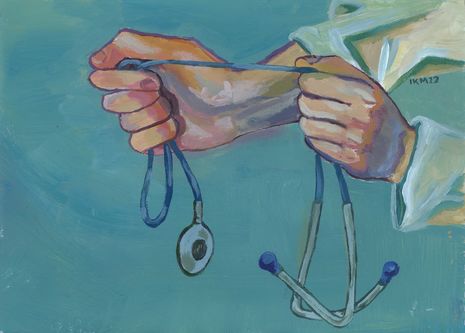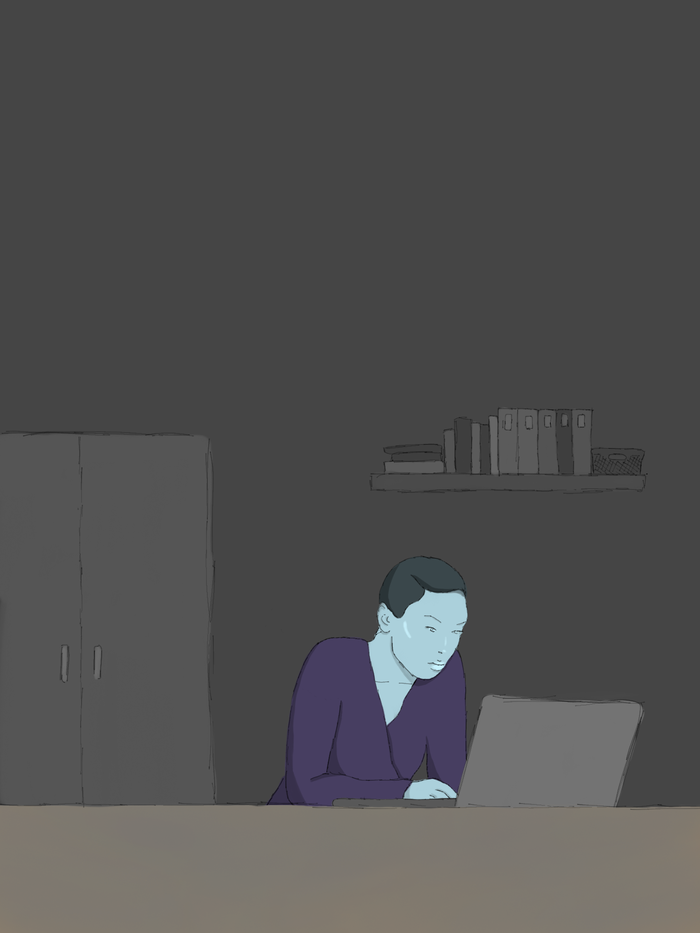Why medics deserve better
Opinions columnist Christina Okafor discusses the BBC’s ‘This Is Going To Hurt’ , relating it to her personal experience as a medical student to advocate for more support from the university to safeguard medics’ welfare

Three episodes deep into the new television adaptation of Adam Kay’s book “This is Going to Hurt”, what struck me was the main character’s brushing off of his boyfriend’s attempts to get him to open-up about his work. Any curiosity about Kay’s welfare is rebutted with “I’m fine thanks”. “How was work?”:“Fine thanks”. “Anything interesting happen today?”: “It was fine”. No spoilers, but everything is clearly not fine. Within medical practice there’s an incessant pressure to act like everything is fine; this is damaging, and we need to do more at an earlier stage to ensure that people are ready to open up.
It could be due to the intense nature of the course, or the eventual desensitisation to what is abnormal to most, but I’m afraid that the steely determination seen in Kay’s show, the Keep Calm and Carry On attitude that has been championed by the government for healthcare workers throughout the pandemic, will lead to a generation of emotionally-constipated doctors – and unfortunately no amount of Senna will fix that (sorry, medic joke). Whether it’s talking about your mental health, or discussing how you feel about your working conditions, university should be the place where good habits are formed. There need to be more spaces for medical students to share what they experience.
“The first time I saw a patient die, I remember how clinical and impersonal everything felt”
One of our lecturers once used Plato’s Allegory of the Cave to depict what our lives will be like as medical students and eventually doctors. Plato describes prisoners chained up in a cave their entire lives, facing the cave wall, where they see shadows cast by objects and people passing behind them, out of sight. Their whole experience of the world is the shadows. One day one of the prisoners is freed and experiences the world as it truly is for the first time. However, when the prisoner goes back to the cave he cannot fully explain his new perception of the world to the other prisoners, try as he might.
I’m no philosopher, but as clinical students we’re taking steps out of the cave. It’s difficult for most students to truly understand our experience. Once we step into clinical school our perception of the world and what we consider normal starts to vastly diverge from other students, making it more difficult to talk about our day-to-day lives – the highs and the lows.
The first time I saw a patient die, I remember how clinical and impersonal everything felt. The lady died whilst her family were outside the room. She was quickly dressed. Her husband and daughter were brought in crying. I stood in the corner whilst the doctor confirmed her death, gave his condolences, and then we left. There was no discussion afterwards. He went off to sign the certificate and I continued on with my morning. It was only when I tried to sleep that night that what I experienced truly hit me. The scene kept on repeating over and over in my mind. Luckily, I have a doctor for a father, who understands this sort of situation and is willing to listen to me talk through my thoughts at 3 o’clock in the morning.
But, the clinical school support structure shouldn’t be such that whether you have someone to talk to is down to chance. We can’t be flung across the East of England on placement and not be given a point of contact, someone there to talk to. Surely that can’t be healthy.
For such a large cohort of students, the voice of medical students at this university is surprisingly quiet, which is part of the reason why I applied to be a writer for this newspaper. The medics here will have many stories – sad, funny and downright shocking. Honestly, if a book were written collecting the stories from medical students here I’m sure it would be a best-seller (hands-off! I said it first – give me my money if you steal this idea). Ever the fly-on-the-wall, the medical student is privy to everything the patient is too scared or embarrassed to tell the doctor, and invisible to staff gossiping freely.
“University needs to be the place where our wellbeing is prioritised, regardless of whether it’ll make us better doctors”
Not everything you want to share has to be traumatic. There should be a regular space to discuss everyday occurrences as well as exceptions. Schwartz rounds – a concept imported from the USA, where medical students gather to discuss things they experience centred around a particular theme – are a good idea that the clinical school has implemented. But these are infrequent, and maybe because I’ve only experienced them over Zoom, not particularly useful. If there were more frequent forums open to all clinical students this might be a better way to share stories – the funny, annoying, and frustrating events that we see on a day-to-day basis.
Kay’s character appears to have been worn down by the NHS machine – his compassion slowly flattened out by a system that doesn’t prioritise you as a person with emotions, but rather views you as just another cog in the machine. University needs to be the place where our wellbeing is prioritised, regardless of whether it’ll make us better doctors. Our wellbeing shouldn’t only be considered in terms of creating a better, more efficient workforce. I don’t know when all of this starts to become mundane, but I hope I never stop caring. And I hope the university doesn’t stop caring too.
 Interviews / You don’t need to peak at Cambridge, says Robin Harding31 December 2025
Interviews / You don’t need to peak at Cambridge, says Robin Harding31 December 2025 News / Unions protest handling of redundancies at Epidemiology Unit30 December 2025
News / Unions protest handling of redundancies at Epidemiology Unit30 December 2025 Comment / What happened to men at Cambridge?31 December 2025
Comment / What happened to men at Cambridge?31 December 2025 Features / ‘Treated like we’re incompetent’: ents officers on college micromanagement30 December 2025
Features / ‘Treated like we’re incompetent’: ents officers on college micromanagement30 December 2025 Theatre / We should be filming ADC productions31 December 2025
Theatre / We should be filming ADC productions31 December 2025









